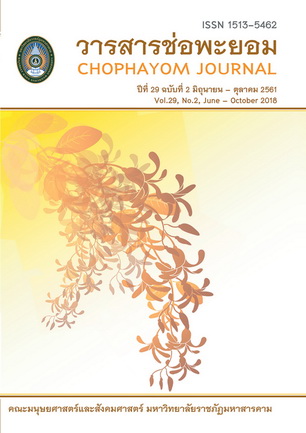Emotional Quotient of Certified Public Accountants (CPAs)in ASEAN Economic Community Era
Emotional Quotient of Auditor in ASEAN Era
Keywords:
Emotional Quotient, Certified Public Accountants (CPAs), ASEAN Economic CommunityAbstract
The adaptation of emotional quotient of certified public accountants (CPAs) in ASEAN economic community erato confront new challenges. In past changing era, Thai societies were facing the problem changes which might stimulate organizations in both government and private sectors to find out guideline for developing the operation for survival. This made working in this situation was very difficult for achieving goals. This pressure might affect the employees by causing mental problem. It was mostly found that emotional problem was the condition which could be occurred with everyone. It sometimes, could not be avoided and affected on physical, mental, emotional, and social of human, especially for the auditor which was the profession requiring many skills, expertise, and knowledge in working such as appropriate communication
skill and emotional control skill that enabled effective working together with the continuous professional development. However, only knowledge, feeling of working under pressure, and lacking of readiness and creativity could not stimulate the employees to work with full performance. This made emotional quotient was very important for the auditor for the self-development in both physically and mentally together with creativity for working which could affect the success of employees for working in the free trade of ASEAN effectively in the future. The purpose of this paper is to current the organization as wholes. Therefore, the
content of the paper is covered in five issuesas follows(1) the role and importance of certified public accountants (CPAs) in ASEAN economic community era, (2) the concepts and theories concern to emotional quotient,(3) the component of emotional quotient, (4) the importance of emotional quotient of certified public accountants (CPAs) in ASEAN economic community era, and (5) techniques for developing in collaboration with others. Keywords : Emotional Quotient, Certified Public Accountants (CPAs), ASEAN Economic
Community
References
สุขภาพจิต.
กระทรวงสาธารณสุข, กรมสุขภาพจิต. (2544). รายงานวิจัยการพัฒนาแบบประเมินความฉลาดทางอารมณ์
สำหรับประชาชนไทย อายุ 12-60 ปี.นนท์บุรี : สำนักพิมพ์วงศ์กมลโปรดักชั่น.
จิรภัทร คงสังข์. (2551). การประยุกต์ใช้แนวปฏิบัติการบัญชีสิ่งแวดล้อมขององค์การ
สหประชาชาติกับบริษัทจดทะเบียนในตลาดหลักทรัพย์แห่งประเทศไทย. รายงานปริญญานิพนธ์ บริหารธุรกิจมหาบัณฑิต สาขาวิชาการบริหาร.
เจษฎา บุญมาโฮม. (2544). ผลของโปรแกรมการแนะแนวกลุ่มต่อการพัฒนาความฉลาดทาง
อารมณ์ของนักศึกษาชั้นมัธยมศึกษาปีที่ 4 โรงเรียนราชวินิตบางเขนกรุงเทพมหานคร.
วิทยานิพนธ์ศิลปศาสตรมหาบัณฑิต. บัณฑิตวิทยาลัย มหาวิทยาลัยเกษตรศาสตร์.
บุญใจ ศรีสถิตนรากูร. (2550). ภาวะผู้นาและกลยุทธ์การจัดการองค์การพยาบาล ในศตวรรษที่ 21.
กรุงเทพฯ: โรงพิมพ์แห่ง จุฬาลงกรณ์.
วีระวัฒน์ ปันนิตามัย. 2545. เชาวน์อารมณ์ (EQ) : ดัชนี วัดความสุขและความสำเร็จของชีวิต.
พิมพ์ครั้งที่ 3, กรุงเทพมหานคร: สำนักพิมพ์เอ็กซ์เปอร์เน็ท.
เทิดศักดิ์ เดชคง. (2547). จากความฉลาดทางอารมณ์สู่สติปัญญา. พิมพ์ครั้งที่ 9. กรุงเทพมหานคร:
สำนักพิมพ์มติชน.
วิชิต นารีผล. (2556). ประสิทธิภาพการทำงาน. วารสารเกษตร บางพระ. กลุ่มพัฒนาบุคคล
กรมพัฒนาที่ดิน.
สภาวิชาชีพบัญชีในพระบรมราชูปถัมภ์. (2555). นักบัญชีใน AEC. www.fap.or.th, (วันสืบค้น: พฤศจิกายน
2555).
สมใจ ลักษณะ. (2543). การพัฒนาประสิทธิภาพในการทำงาน. กรุงเทพฯ: คณะวิทยาการจัดการ สถาบัน
ราชภัฏสวนสุนันทา.
สมมาศ พลเยี่ยม และคณะ. (2552). ผลกระทบของความฉลาดทางอารมณ์ที่มีต่อประสิทธิภาพการทำงาน
ของพนักงานธนาคารออมสิน ภาค 9. หลักสูตรบริหารธุรกิจมหาบัณฑิต คณะการบัญชีและการ
จัดการ มหาวิทยาลัยมหาสารคาม.
Bahdor G.K., Mahmoud M., Roozbeh H., and Farzad F.,Reza. (2011). “The impact of
Emotional Intelligence towards the Effectiveness of Delegation; A Study in
Banking Industry in Malasia.” International Journal of Business and Social Science. Vol. 2 No. 18; Oct., 93-99.
Cooper, R. K.; and Sawaf, A. (1997). Executive Intelligence in Leadership and Organization.
New York: Grosset Putam.
Goleman, D. (1998). Working with Emotional Intelligence. New York: Bantam Book.
Mayer, J. D. and P. Salovey. (1997). “What is emotional intelligence”. Emotional
Development and Emotional Intelligence: Education Implication. New York: Basic Books.
Mehment D.A., Dogan N.L., Mahmut Arslan, Mustafa Kilic and Mustafa Kemal Oktem.
(2005). “The impact of IQ and EQ on pre-eminent achievement in organization: implications for the hiring decisions of HRM Specialists”. International Journal of Human Resource Management. 16:5 May : 701-719.
Weisinger, H. (1998). Emotional Intelligence at work. San Francisco, CA: Jossey-Bass Inc.
Woodcoch. (1989).Team Development Manual. 2nd ed. Hunts: Gower,.






